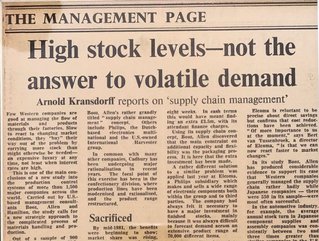Keith Oliver - the man who gave us 'supply chain management'

British logistician and business consultant Keith Oliver is a trailblazer in the truest sense of the word, being the very man who brought the term ‘supply chain’ to the attention of the wider world.
Keith Oliver was educated in the UK at Monmouth School and Birmingham University. He was a Methods Analyst at the West Midlands Gas Board before joining consultancy firm Booz Allen Hamilton.
It was while there, in the late 1970s, that Oliver began formulating his revolutionary ideas while working with clients including SKF, Heineken, Hoechst, Cadbury-Schweppes, and Philips.
His key ideas around the subject are said to have gelled during an engagement with Philips, the Dutch consumer electronics manufacturer.
During this time, Oliver first developed his vision for tearing down the functional silos that separated production, marketing, distribution, sales, and finance – to generate a reduction in inventory and a simultaneous improvement in customer service.
Looking for a catchy phrase to describe the concept, Oliver’s colleagues suggested the term ‘integrated inventory management’.
Oliver coins SCM in interview with FT
But Oliver was not convinced. On June 4, 1982, he forever changed how we would refer to the business of moving goods around the world. In an interview with Arnold Kransdorff in the Financial Times, Oliver discussed his new business concept, which he dubbed ‘supply chain management’.
It should be pointed out that Oliver was part of a team that created the concept of 'supply chain management'. The first project the team was involved in ran from 1980-82 in Switzerland, under the management of business analyst Wolfgang Partsch. The term first appeared in print in 1982, in the German business magazine, Wirtschaftswoche.
However, it was the FT piece that brought the term to the attention of the wider world. In it, Oliver defined the term thus: “Supply chain management (SCM) is the process of planning, implementing, and controlling the operations of the supply chain, with the purpose to satisfy customer requirements as efficiently as possible. It spans all movement and storage of raw materials, work-in-process inventory, and finished goods from point-of-origin to point-of-consumption.”
The term could have easily disappeared into the history of business jargon. Instead, SCM rapidly passed into the public domain – a sure sign the concept resonated with executives wrestling with the endless challenges of procurement, logistics, operations, sales, and marketing activities that fall within its realm.
Oliver went on to serve Booz Allen for 41 years, and, down the decades, undertook boardroom-level assignments across all manner of businesses, focusing on supply chain strategy and management control.
As a consultant, he was able to offer laser-sharp guidance on all aspects of industry supply chains, from material procurement and purchasing through the manufacturing processes, as well as distribution and the marketplace interfaces of demand capture and customer service.
Supply chain management has changed with time
Towards the end of his career, Oliver’s focus turned to how service businesses could find real-world applications for the supply chain
In an article headline, ‘When will supply chain management grow up?’, Tim Laseter – a supply chain professional now with the University of Virginia – explored the origins and evolution of Oliver’s SCM concept.
He wrote: “Both the term and the discipline it describes have evolved considerably during the past two decades. Indeed, by today’s standards, the original scope of SCM appears quite narrow.
“Initially, it applied only within the boundaries of a single company. The challenge was simply getting production, sales, finance, marketing, and distribution operating in concert to focus on the movement and availability of finished goods.
“It’s hard to believe that management’s perspective could have been so limited.”
Laseter added: “SCM began to look outside the company’s four walls and the first place attention alighted, naturally, was on customers.”
But he goes on to point out that, since the late 1990s, many leading companies have placed greater emphasis on cost reduction and innovation at the supplier end of the chain.
“With this evolution, SCM’s scope has expanded well beyond the movement of materials,” Laster writes. “Now, the term ‘supply chain management’ encompasses such concepts as strategic sourcing and supplier involvement in product development.”
The term has, however, evolved and Oliver’s place in the pantheon of noted supply chain figures is secure.







